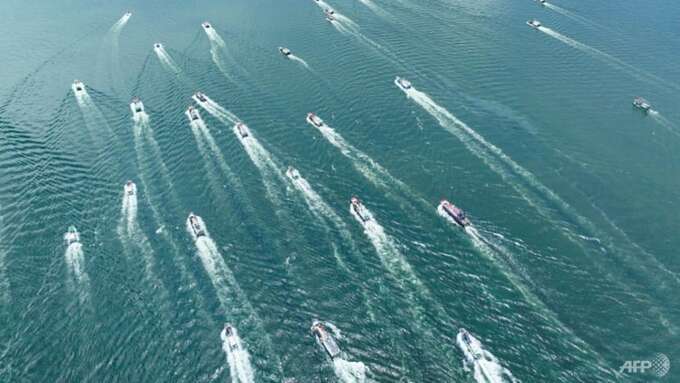May 26, 2025 | 16:51 GMT +7
May 26, 2025 | 16:51 GMT +7
Hotline: 0913.378.918
May 26, 2025 | 16:51 GMT +7
Hotline: 0913.378.918

Many had hoped that the fifth session of negotiations on a marine biodiversity treaty for international waters, which began on Aug 15, 2022 at the United Nations headquarters in New York, would have been the last. Photo: AFP/STR
After 15 years, including four prior formal sessions, negotiators have yet to reach a legally binding text to address the multitude of issues facing international waters - a zone that encompasses almost half the planet.
"Although we did make excellent progress, we still do need a little bit more time to progress towards the finish line," said conference chair Rena Lee.
It will now be up to the UN General Assembly to resume the fifth session at a date still to be determined.
Many had hoped the session, which began on Aug 15 at the UN headquarters in New York, would be the last and yield a final text on "the conservation and sustainable use of marine biodiversity beyond national jurisdiction", or BBNJ for short.
"While it's disappointing that the treaty wasn't finalised during the past two weeks of negotiations, we remain encouraged by the progress that was made," said Liz Karan of the non-governmental organisation (NGO) Pew Charitable Trusts, calling for a new session by the end of the year.
One of the most sensitive issues in the text revolved around the sharing of possible profits from the development of genetic resources in international waters, where pharmaceutical, chemical and cosmetic companies hope to find miracle drugs, products or cures.
Such costly research at sea is largely the prerogative of rich nations, but developing countries do not want to be left out of potential windfall profits drawn from marine resources that belong to no one.
"MISSED OPPORTUNITY"
Similar issues of equity arise in other international negotiations, such as on climate change, in which developing nations that feel outsized harm from global warming have tried in vain to get wealthier countries to help pay to offset those impacts.
The high seas begin at the border of a nation's exclusive economic zone (EEZ) - which by international law reaches no more than 370km from its coast - and are under no state's jurisdiction.
Sixty per cent of the world's oceans fall under this category.
And while healthy marine ecosystems are crucial to the future of humanity, particularly to limit global warming, only one percent of international waters are protected.
One of the key pillars of an eventual BBNJ treaty is to allow the creation of marine protected areas, which many nations hope will cover 30 per cent of the Earth's ocean by 2030.
"Without establishing protections in this vast area, we will not be able to meet our ambitious and necessary 30 by 30 goal," United States State Department official Maxine Burkett said at an earlier press conference.
But delegations still disagree on the process for creating these protected areas as well as how required environmental impact assessments will be implemented before new high seas activity begins.
"What a missed opportunity ...," tweeted Klaudija Cremers, a researcher at the IDDRI think tank, which, like multiple other NGOs, has a seat with observer status at the negotiations.
The delegate from Samoa, addressing the conference on behalf of the smaller developing island nations of the Pacific, said they were "disappointed".
"We live very far and it is not cheap to travel all this way. This money was not spent on roads, on medicine, schools," she added.
"The Pacific came here in good faith and will continue to do so until we conclude this conference in the very near future," she said on the verge of tears, to applause from the room.
Laura Meller, of Greenpeace's Protect the Oceans campaign, said: "Time has run out. Further delay means ocean destruction. We are sad and disappointed. While countries continue to talk, the oceans and all those who rely on them will suffer."
(AFP)

(VAN) Alt Carbon has raised $12 million in a seed round as it plans to scale its carbon dioxide removal work in the South Asian nation.

(VAN) Attempts to bring down the price of the Japanese staple have had little effect amid a cost-of-living crisis.

(VAN) Fourth most important food crop in peril as Latin America and Caribbean suffer from slow-onset climate disaster.

(VAN) Shifting market dynamics and the noise around new legislation has propelled Trouw Nutrition’s research around early life nutrition in poultry. Today, it continues to be a key area of research.

(VAN) India is concerned about its food security and the livelihoods of its farmers if more US food imports are allowed.

(VAN) FAO's Director-General emphasises the need to work together to transform agrifood systems.

(VAN) Europe is facing its worst outbreak of foot-and-mouth since the start of the century.